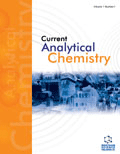
Current Analytical Chemistry
metrics 2024
Highlighting significant strides in analytical methodologies.
Introduction
Current Analytical Chemistry is a pivotal journal in the field of analytical chemistry, published by Bentham Science Publishers Ltd. Established to bridge the gap between fundamental research and practical applications, this journal offers a platform for the dissemination of significant advancements and innovations from the realms of chemical analysis techniques and methodologies. With an impressive scope covering both theoretical and applied analyses, it has successfully secured a Q3 category ranking in the 2023 metrics of Analytical Chemistry, positioned at #75 out of 156 in the Scopus rankings. Researchers, professionals, and students can expect to engage with high-quality content that reflects the latest trends and issues within the discipline. Although it currently does not offer Open Access options, the journal continuously strives to maintain high editorial standards that contribute to its impactful presence in the academic community. The convergence of ideas from 2006 to 2024 promises to uphold its reputation as a reliable source for cutting-edge research in analytical chemistry.
Metrics 2024
 0.29
0.29 1.70
1.70 1.50
1.50 38
38Metrics History
Rank 2024
Scopus
IF (Web Of Science)
JCI (Web Of Science)
Quartile History
Similar Journals
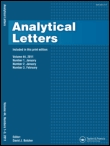
ANALYTICAL LETTERS
Connecting Researchers in Analytical SciencesANALYTICAL LETTERS is a reputable journal published by Taylor & Francis Inc, focusing on the dynamic fields of analytical chemistry, biochemistry, and clinical biochemistry. With an ISSN of 0003-2719 and an E-ISSN of 1532-236X, the journal has been a platform for scholarly articles since its inception in 1967, and is set to continue its contribution to the scientific community until 2024. Despite its classification in Q3 across various categories as of 2023, including analytical chemistry and spectroscopy, ANALYTICAL LETTERS maintains a significant impact within its field, evidenced by its moderate rankings within Scopus. This journal serves as a vital resource for researchers and professionals seeking to explore recent advancements in analytical methodologies, instrumentation, and applications, facilitating the dissemination of critical insights in laboratory practices. With access primarily through institutional subscriptions, it remains positioned as a crucial tool for those advancing knowledge and innovation in analytical sciences.
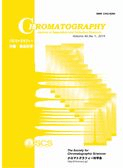
Chromatography
Unveiling breakthroughs in chromatography for a sustainable future.Chromatography is an esteemed journal published by the SOC CHROMATOGRAPHIC SCIENCES, dedicated to advancing the field of chromatographic techniques and their applications across various disciplines, including analytical chemistry, biochemistry, and environmental science. By facilitating the exchange of high-quality research, Chromatography plays a pivotal role in enhancing methodologies and technologies that drive innovation in sample analysis. While the journal is not currently open access, it maintains a rigorous peer-review process, ensuring the publication of valuable and impactful studies. Researchers, professionals, and students alike can benefit from its comprehensive coverage of chromatography-related advancements, making it a vital resource for anyone engaged in this dynamic area of study.
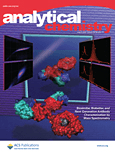
ANALYTICAL CHEMISTRY
Exploring the Depths of Chemical UnderstandingANALYTICAL CHEMISTRY, published by the American Chemical Society, is a leading journal in the field of analytical chemistry, with a significant impact factor reflecting its reputation and scholarly influence. With an impressive ranking of 14th out of 156 in its category, placing it in the 91st percentile among its peers, this journal is essential for researchers, professionals, and students alike who are looking to stay at the forefront of developments in analytical techniques and methodologies. Established in 1947, ANALYTICAL CHEMISTRY covers a broad range of topics within the discipline, all aimed at advancing the scientific community's understanding of complex chemical systems. Although currently not an Open Access journal, its rigorous peer-review process ensures the publication of high-quality research aimed at significant innovations in the analytical field. With its publication spanning up to 2024, it continues to be a valuable resource for those seeking to enhance their research and contribute to the global discourse in analytical chemistry.

Brazilian Journal of Analytical Chemistry
Bridging Gaps in South American Analytical ScienceBrazilian Journal of Analytical Chemistry, published by VISAO FOKKA COMMUNICATION AGENCY, serves as a vital platform for those engaged in the field of analytical chemistry, especially within the Latin American context. With an ISSN of 2179-3425 and an E-ISSN of 2179-3433, this journal aims to promote high-quality research and advancements in analytical methodologies, instrumentation, and applications spanning from 2010 to the present. Although it currently holds a Q4 rank in Analytical Chemistry by Scopus and is placed at the 24th percentile, its commitment to open access publishing provides invaluable opportunities for widespread dissemination of knowledge, catering to researchers, professionals, and students alike. The journal's editorial board comprises emerging and established experts aiming to bridge gaps in analytical chemistry research, particularly in a Brazilian and broader South American context. Situated in São Paulo, Brazil, the journal's role in fostering innovation and collaboration in analytical techniques makes it an essential resource for the academic community.
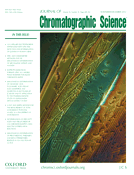
JOURNAL OF CHROMATOGRAPHIC SCIENCE
Fostering Knowledge for Analytical BreakthroughsWelcome to the Journal of Chromatographic Science, a premier publication dedicated to advancing the scientific understanding of chromatographic techniques and their applications across various disciplines. Published by Oxford University Press Inc, this journal, with its ISSN 0021-9665 and E-ISSN 1945-239X, has been disseminating innovative research since 1963, serving as a vital resource for researchers, industry professionals, and academic scholars in the fields of Analytical Chemistry and Medicine. As evidenced by its 2023 Scopus ranking, the journal stands at the Q3 quartile in both its primary disciplines, highlighting its relevance and contribution to ongoing research. The journal promotes high-quality, peer-reviewed articles that aim to foster knowledge and encourage the practical application of chromatographic science. While it operates under a traditional subscription model, the valuable insights it offers are essential for those seeking to enhance their expertise and stay at the forefront of chromatographic methodologies. Join our community of scholars as we explore the complexities and innovations in chromatographic science, paving the way for future discoveries.

CHINESE JOURNAL OF ANALYTICAL CHEMISTRY
Catalyzing Progress in Analytical MethodologiesCHINESE JOURNAL OF ANALYTICAL CHEMISTRY, published by SCIENCE PRESS in China, stands as a prominent platform in the field of analytical chemistry since its inception in 1989. With its ISSN 0253-3820 and E-ISSN 1872-2040, the journal maintains a vital role in disseminating empirical research and innovative methodologies, contributing to the advancement of analytical techniques and their applications. The 2023 Scopus ranking positions the journal in the third quartile (Q3) within its category, reflecting a respectable standing among its peers. Researchers, professionals, and students alike engage with a broad range of topics, from instrumental analysis to environmental monitoring, each aiming to foster further scientific inquiry. Although it does not currently offer Open Access, the journal's rich repository of knowledge continues to be an essential resource for those in the analytical chemistry community, with an enduring commitment to scientific excellence and collaboration.
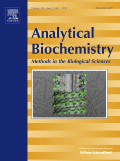
ANALYTICAL BIOCHEMISTRY
Advancing the Frontiers of Biochemical ResearchANALYTICAL BIOCHEMISTRY is a leading journal dedicated to publishing high-quality research in the fields of biochemistry, biophysics, molecular biology, and cell biology. Published by Academic Press Inc. Elsevier Science, this journal has been a cornerstone of scientific communication since its inception in 1960, with a wide-ranging scope that encompasses a variety of analytical techniques and biochemical applications. Although not an Open Access journal, it boasts a solid reputation with a 2023 ranking in the 3rd quartile for both Biochemistry and Biophysics, and it continues to play a significant role in advancing knowledge and fostering collaboration among researchers. With its comprehensive editorial standards and rigorous peer-review process, ANALYTICAL BIOCHEMISTRY serves as an essential resource for professionals and students aiming to stay abreast of the latest developments and methodologies in the biochemical sciences. Its indexed presence in Scopus highlights its impact and relevance, emphasizing the journal’s commitment to disseminating breakthrough findings that contribute meaningfully to scientific discourse.
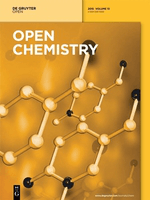
Open Chemistry
Catalyzing Progress in Chemistry and Materials ScienceOpen Chemistry, published by DE GRUYTER POLAND SP Z O O, is a distinguished peer-reviewed journal that has been serving the global chemistry community since its inception. With an ISSN of 2391-5420 and an E-ISSN also of 2391-5420, this open-access journal has been accessible to researchers and practitioners alike since 2015, ensuring a wide dissemination of high-quality research findings. Located in Germany, specifically at BOGUMILA ZUGA 32A STR, 01-811 WARSAW, MAZOVIA, POLAND, Open Chemistry aims to publish innovative research across various chemical disciplines, with special attention to miscellaneous chemistry and materials chemistry. It is currently ranked in the Q3 category for both fields as of 2023, reflecting its solid standing within the academic community, with specific ranks of 187/408 in General Chemistry and 153/317 in Materials Chemistry, corresponding to respective percentiles of 54 and 51. Open Chemistry not only enhances the accessibility of cutting-edge research but also serves as a vital resource for students, professionals, and scholars seeking to advance their knowledge in the rapidly evolving landscape of chemical sciences.

Talanta Open
Bridging Gaps in Chemical Knowledge SharingTalanta Open (ISSN: 2666-8319) is a prominent open-access journal published by Elsevier, dedicated to advancing the field of Analytical Chemistry. Established in 2020, the journal aims to foster innovative research and facilitate knowledge sharing in the analysis of chemical substances and their interactions. With an impressive Q2 ranking in the Analytical Chemistry category and a commendable Scopus ranking of #57/156, Talanta Open has quickly established itself as a vital resource for researchers, professionals, and students alike. The journal is known for its rigorous peer-review process and commitment to quality, ensuring that published content significantly contributes to the scientific community. By providing unrestricted access to high-quality research, Talanta Open underscores the importance of collaboration and accessibility in the ever-evolving landscape of analytical science.

LCGC North America
Delivering Insights for the Analytical Chemistry CommunityLCGC North America is a pivotal resource in the field of Analytical Chemistry, published by MJH Life Sciences. Since its inception in 1999, the journal has strived to bridge the gap between scientific research and practical applications, catering to a diverse audience that includes researchers, professionals, and students interested in chromatography and related analytical practices. Although currently categorized in the Q4 quartile of Analytical Chemistry, with a Scopus rank of #137 out of 156, LCGC North America is dedicated to delivering insightful articles that foster discussion and innovation within the analytical chemistry community. With a commitment to quality content, the journal covers a broad spectrum of topics, ensuring that readers remain informed about the latest developments and trends in the field. Despite its non-open access model, readers can access its valuable resources through institutional subscriptions and various library networks, making it a vital asset for those engaged in cutting-edge research and practice. Located in Cranbury, NJ, United States, LCGC North America continues to contribute significantly to the advancement of analytical methodologies and technologies.